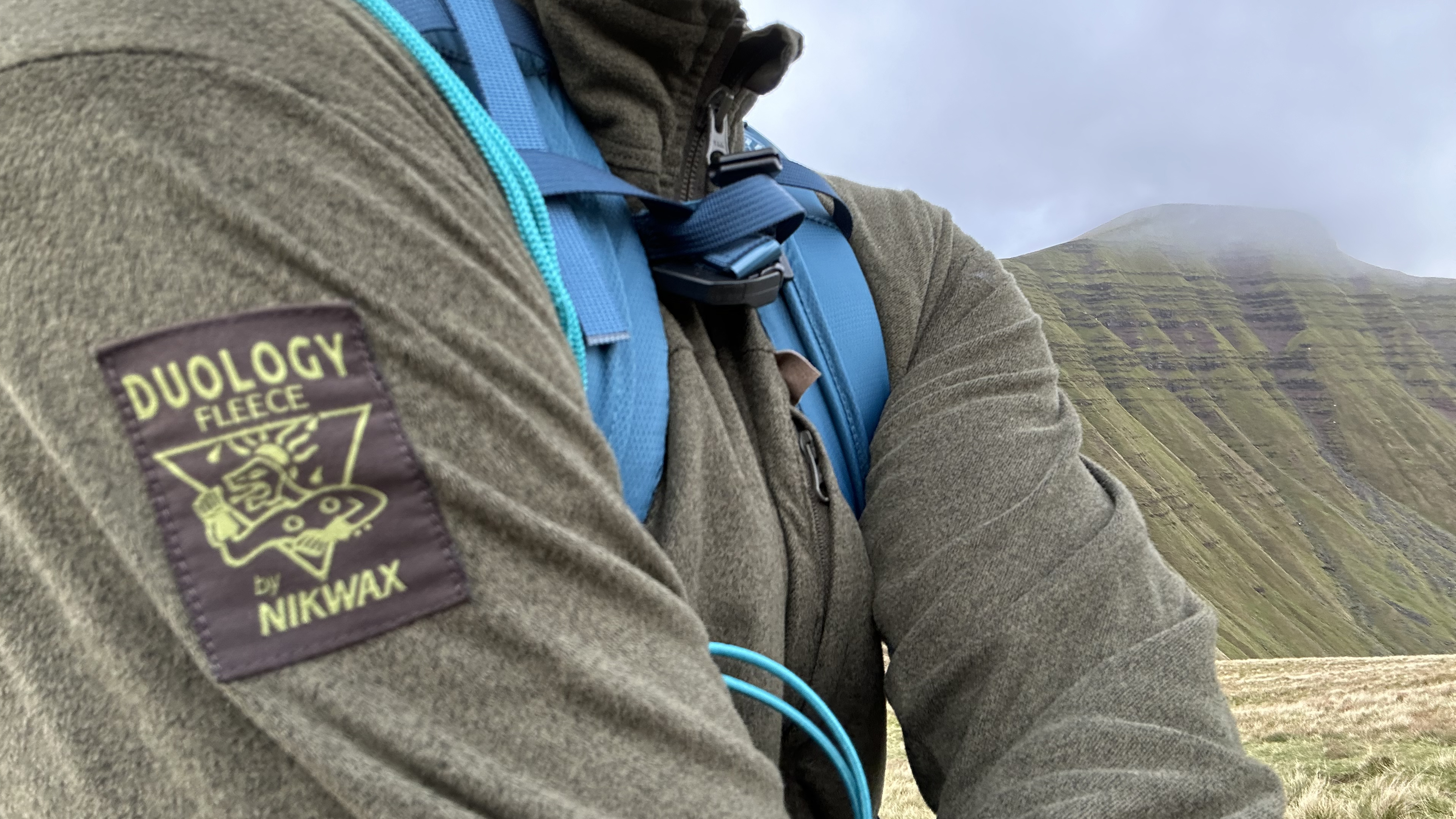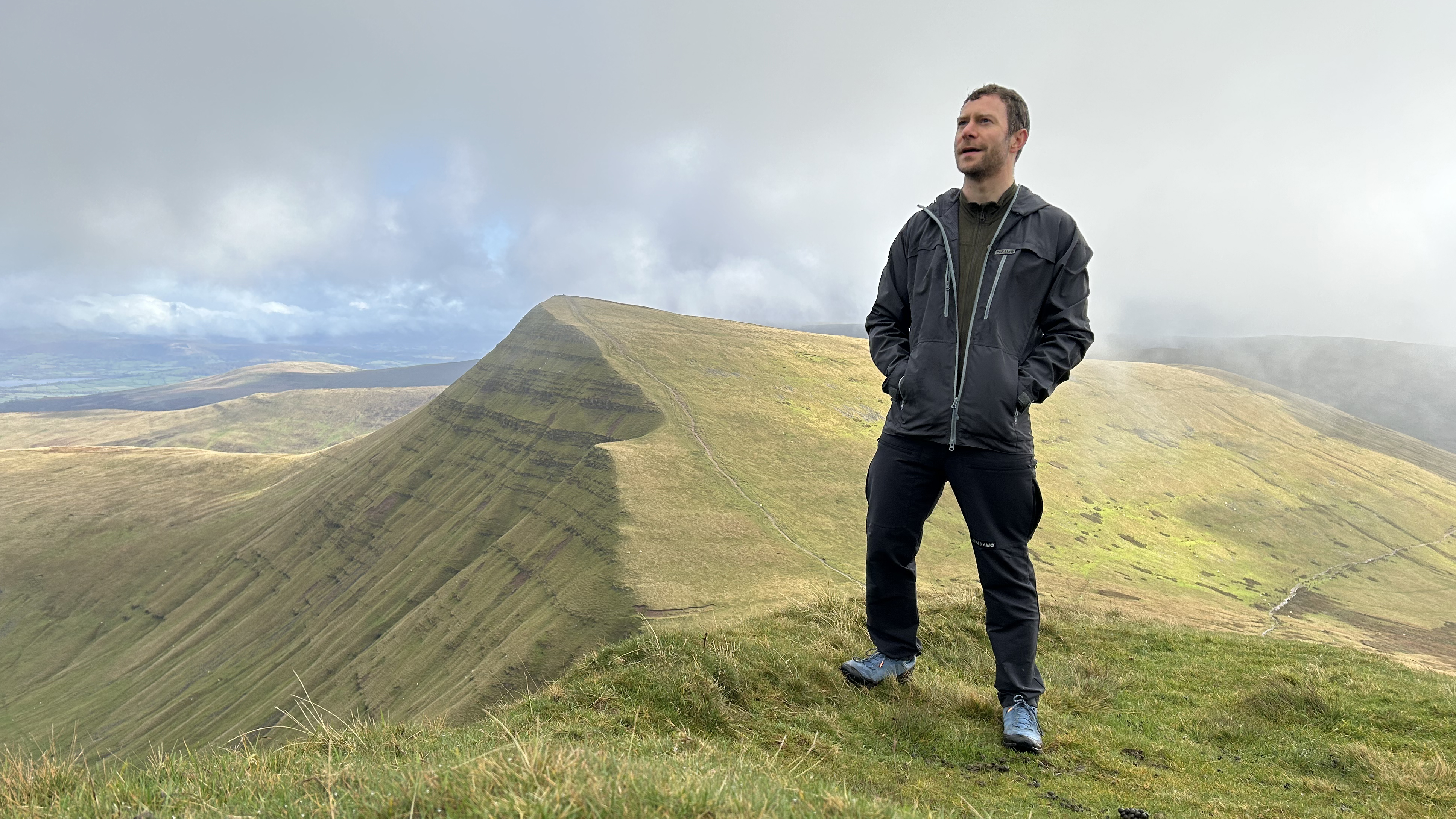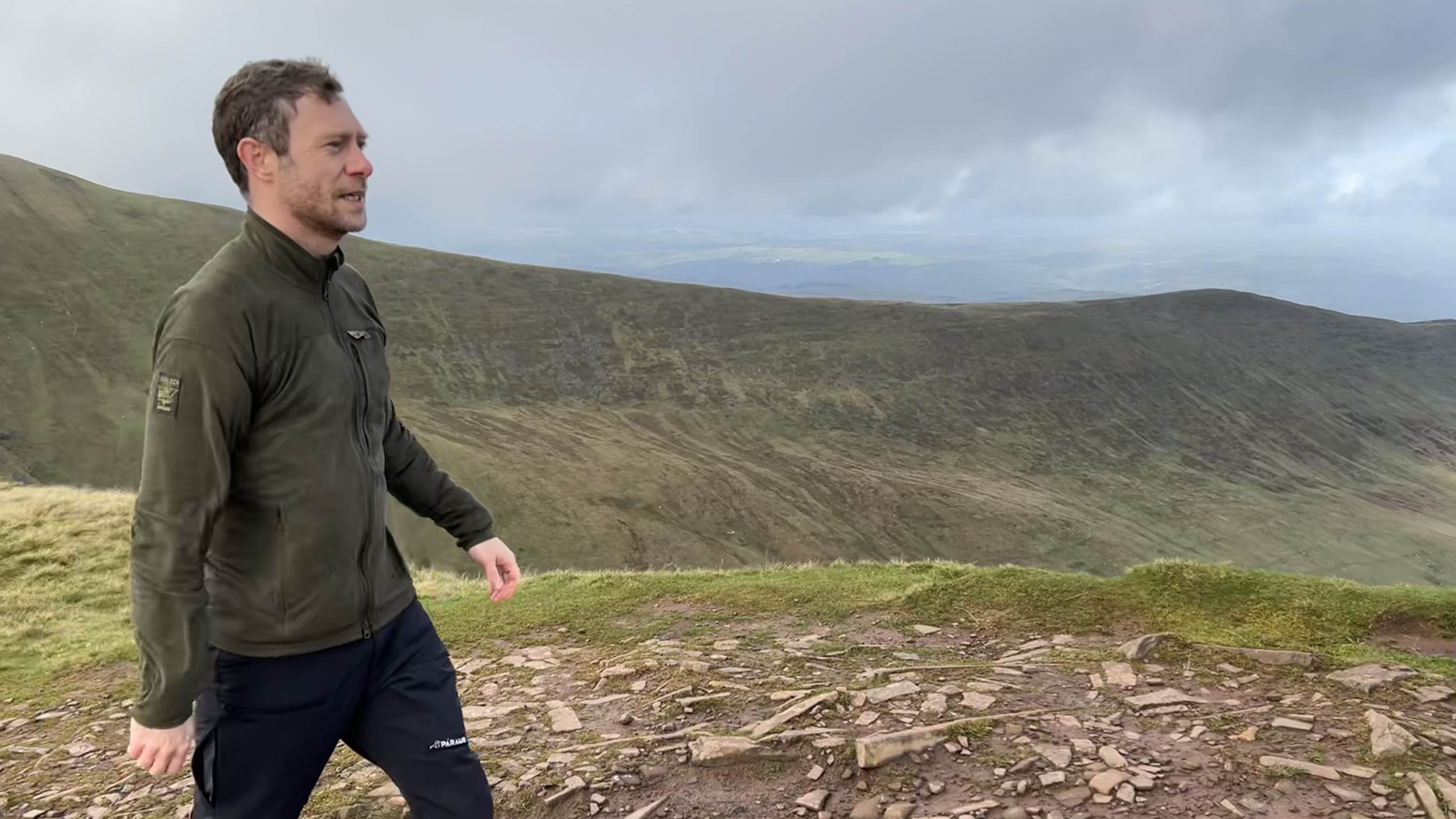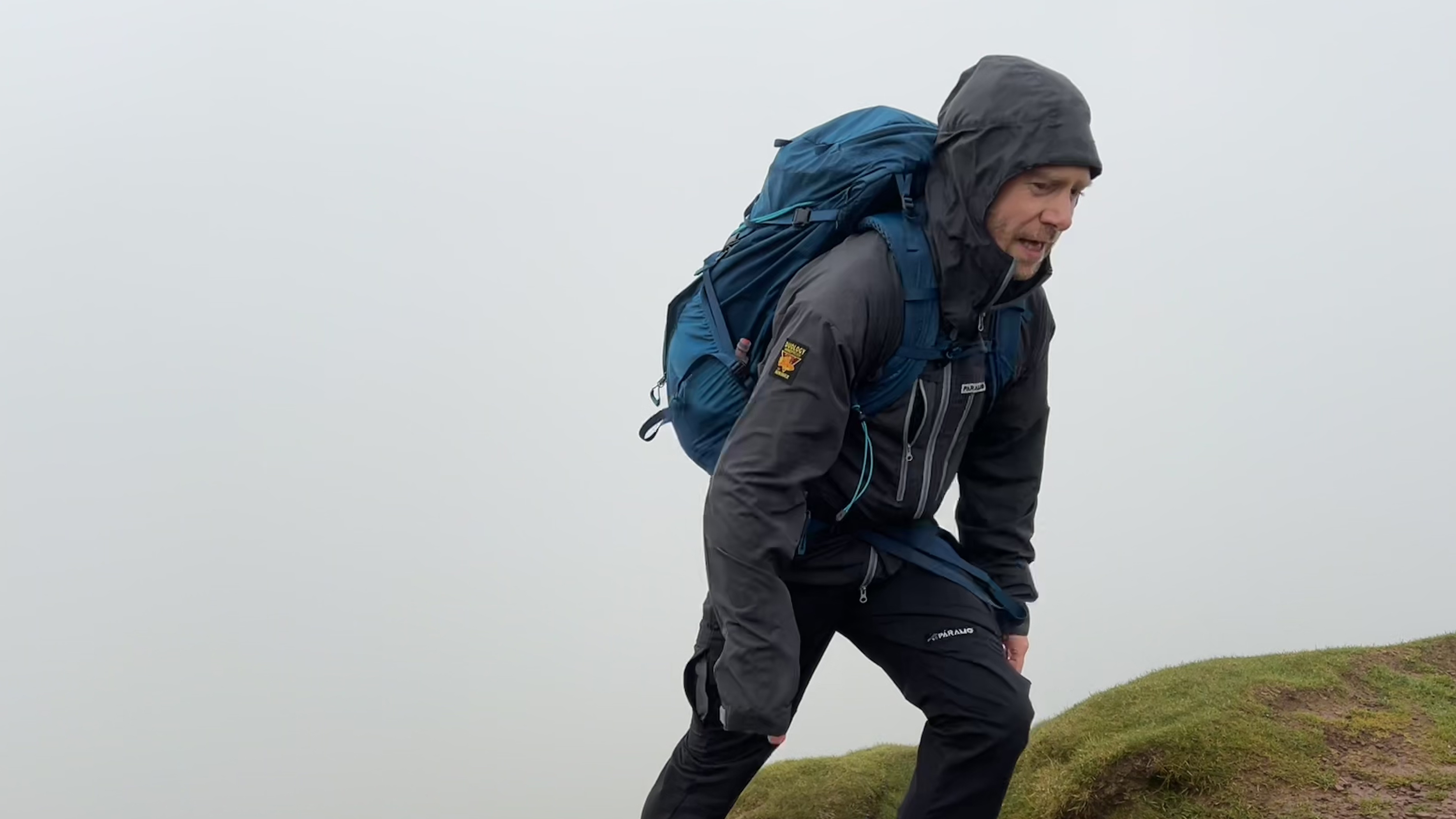
First impressions
RRP: $139.95 (US) / £130 (UK)
Weight: 403g / 14.2oz
Sizes: S to XXL
Fabric: Nikwax Duology Fleece, PFC-free water repellent finish (per and polyfluorinated compounds)
Colors: Steel Marl, Midnight Marl, Moss Marl, Outback Red
The Bentu feels different to other fleeces. The face fabric feels smooth, almost velvety, while it’s also pleasingly lightweight. First wear reveals its insulating qualities; it’s nicely warming despite the main fabric being quite thin. This hints at the top’s suitability as a technical mid-layer, where many thin layers are preferable over thicker ones.
It’s got quite a relaxed fit and a practical, workhorse aesthetic. It’s not quite as flattering as a top with a more athletic profile but it’s the kind of fleece that makes you think ‘he means business.’ I’d wear it to the pub after a hike, for sure, but perhaps not for more formal events. This is a fleece for the backcountry, for mountain missions, not for pleasantries.

Nikwax Duology Fleece fabric
The Nikwax Duology Fleece fabric is breathable and lightweight, providing a decent amount of insulation and some protection against rain thanks to a PFC-free water repellent finish. It’s also highly wind resistant, more so than most mid-layers, making it a great option for dry, blustery days on mountain ridges.
As mentioned, the Bentu Fleece is designed to be paired with the Bentu Windproof Jacket, which Páramo say ‘provides warm, waterproof protection.’ This is true up to a point, though the combination isn’t as effective as simply wearing a waterproof hardshell instead. Páramo also sell a more water resistant Bentu Plus Fleece, which it recommends for prolonged wet weather. However, this standard Bentu Fleece is treated with DWR (durable water repellent), so fends off light rain and showers whether worn together with the jacket or individually.

Páramo is a brand that thinks a little bit outside the box. Its founder, Nick Brown, is the same chap behind the popular aftercare brand Nikwax. Its innovative textile systems, specified and tested by Nikwax, result in directional clothing, which is the brand’s slogan. Directionality is all about moving liquid water away from the body, which is obviously essential when it comes to outdoor clothing's performance. Páramo is so confident in its own approach that you won’t find the likes of Gore-Tex membranes in its jackets, or Polartec in its fleeces.
It’s also a brand striving towards sustainability and has a clear strategy, supporting conservation associations and striving to make its products longer lasting, as well as recyclable when they do reach the end of life stage. Its 30-year-old partnership with the Miquelina Foundation – which provides fair work opportunities for women in Bogotá, Colombia, and produces 80% of Páramo’s annual output – is something the brand is rightly proud of. It’s also got a recycling scheme that provides customers with discounts on new gear – a similar concept to those practised by other sustainability pioneers, such as Patagonia and Rab.

I’ve tested several Páramo products over the years and have generally been impressed with the quality, performance and durability. The Páramo Bentu Fleece is designed to be paired with the Páramo’s Men’s Bentu Windproof Jacket. I tested the jacket in 2023, often wearing the fleece underneath. Since then, I’ve been wearing the fleece separately, letting it out into the world on its own two feet (or should that be sleeves?).
Meet the reviewer
Features
The jacket and fleece’s handwarmer pockets sync up – the jacket has both outer and inner YKK zippers, allowing you to access the fleece’s pockets too, without having to take the jacket off. This is a nice touch, as the fleece's pockets are undoubtedly the cozier option. However, a daypack's hipbelt covers the pockets, so they're not always readily accessible when hiking.
The fleece also has a YKK zippered left breast pocket for valuables, as well as an open, mesh inner drop pocket, useful for quickly stashing gels and the like. Both are large enough to slide a map into, handy if you’re going to be pulling it out often while navigating complex terrain.

The devil is definitely in the design detail here – Páramo knows what it's doing. The 2-way front zipper is backed by a storm flap for additional protection against water ingress. The ability to open up from the top and bottom adds versatility when it comes to dumping heat or the addition or removal of layers.
Other subtle features include the semi-elasticated cuffs that are easily pushed up or wrapped around a pair of gloves to keep the heat in. Meanwhile the hem is lower cut at the back to provide additional coverage and protection.
On the trails

I’ve been testing the Bentu Fleece for more than a year, wearing it with its matching jacket, under waterproof hardshells and as a warm outer in drier weather. It’s been a handy fleece to have along on many mountain adventures and I’ve been hugely impressed with its performance. There are no issues with freedom of movement, it’s comfortable, warm without being too toasty and versatile.
Let’s deal with the Bentu Jacket and Fleece combination first. Anyone who’s read my review of the Bentu Windproof Jacket will know that I found that the combination fell short when it came to waterproof protection in prolonged precipitation. Páramo assert that, when combined, the duo should be able to withstand at least four hours of heavy rain. I found that this simply wasn’t the case on a wet hike in the English Lake District and I ended up getting soaked. However, I’ve also worn the pair together in more mixed conditions – heavy showers followed by dry spells – and discovered that the combo worked superbly, certainly preferable to wearing a more restrictive waterproof hardshell.

So, it’s consistent heavy rain that the duo struggle with. With this in mind, I wouldn’t recommend the Bentu combo if you hike in wetter climates, such as the UK or the Pacific Northwest, and heavy rain is in the forecast. In these instances, when it comes to windbreaker vs rain jacket, it’s rain jacket all the way. For those in drier climes, or when there's a more favorable forecast, go for it.
Of course, the Bentu Fleece isn’t tethered to the matching jacket, so I’m keen to judge it on its own merits. As a warm outer fleece or as a mid-layer beneath a waterproof jacket, it excels. As a mid-layer, it hits the sweet spot in terms of providing just enough insulation to work well alongside other layers in colder conditions. A 2-way, full-length zippered front opening provides versatility when it comes to taking layers off or dumping heat.

When worn as an outer layer, its wind repelling qualities are obvious. Other fleeces would have me reaching for my hardshell in gusty conditions, but the Bentu bats away the wind away with ease. On a blustery day in the Central Beacons of the Bannau Brycheiniog National Park, I noticed everyone I passed was wearing a hardshell or windproof jacket to shield themselves against the gusting wind, while I was fine wearing just my base layer and the fleece. How smug I felt! Its DWR coating makes it showerproof, and it dries relatively quickly too.
I was just about able to squeeze a topographical map into the breast pocket, though it’s a very tight squeeze and the map's presence inhibits movement and is a little uncomfortable. So, despite Páramo suggesting it as an option, I went for the interior drop pocket for this use, as it felt less restrictive.

I was just about able to manipulate the zippers while wearing hiking gloves, though I can imagine they’d be a bit of a struggle when wearing thicker winter gloves or mitts. So, it seems a shame that there’s no additional pulls to make it easier. However, serious winter adventurers could always add their own to the zipper loops.







